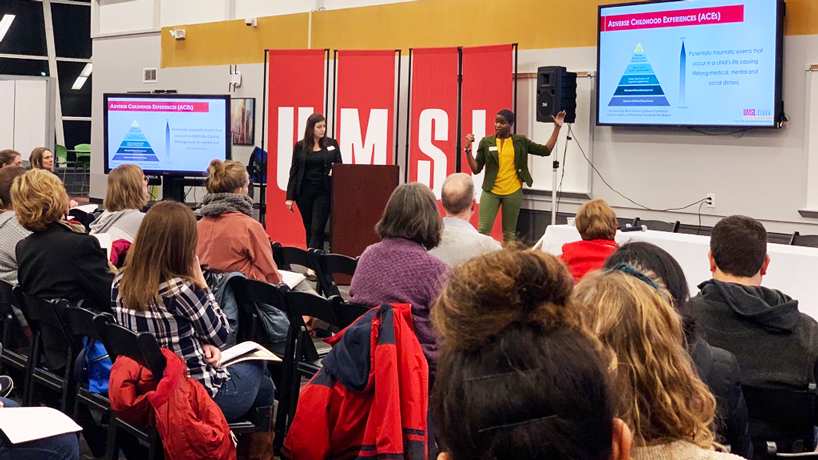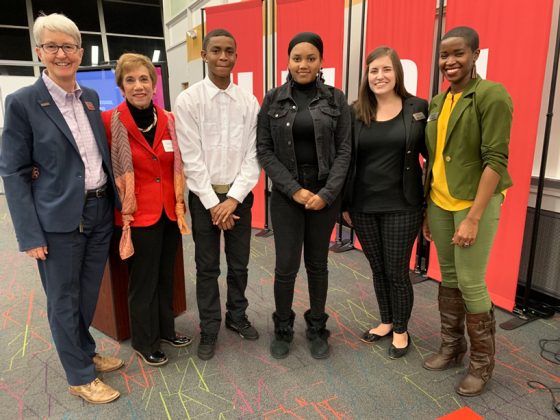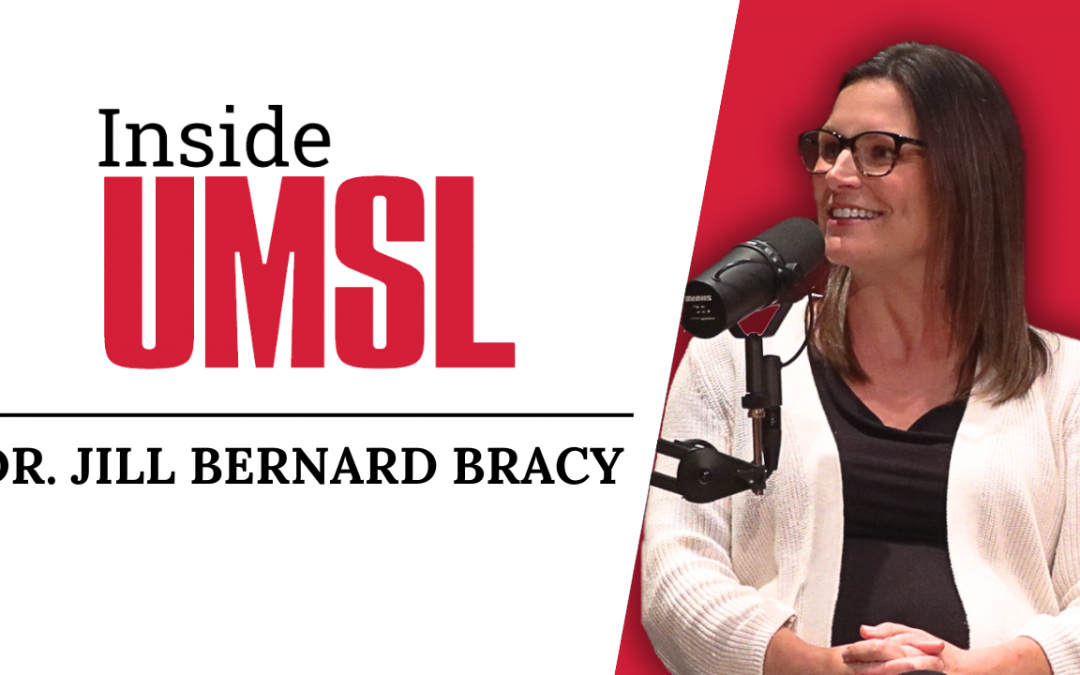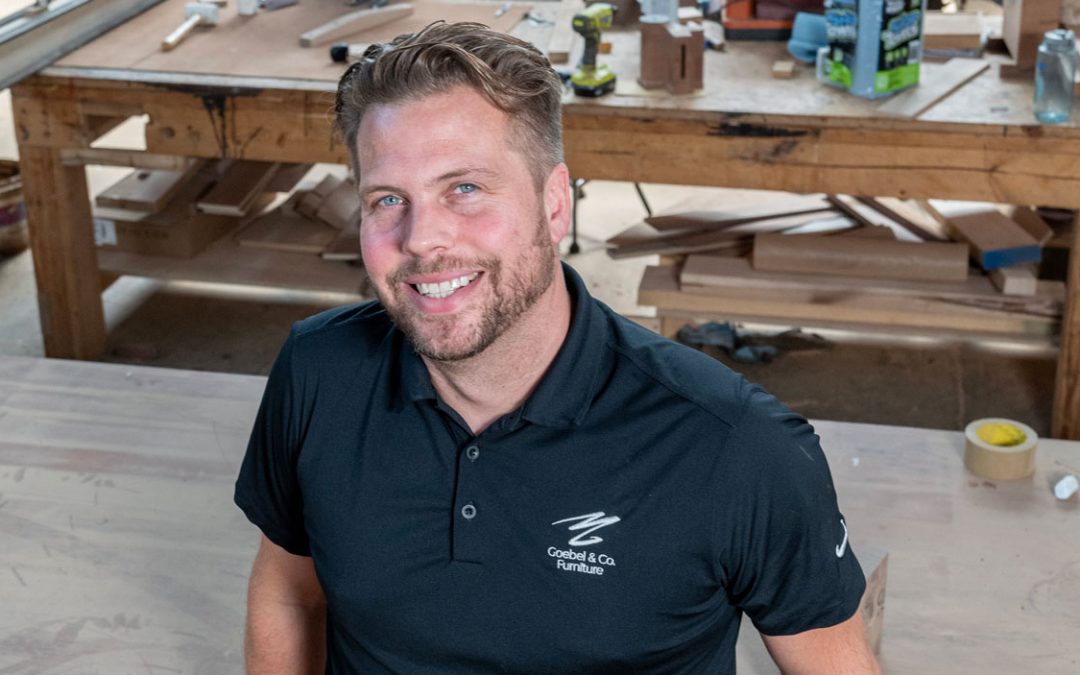
Emily Brown (left) and Mary Edwin, both UMSL assistant professors of counseling, lead a keynote presentation on trauma strategies for educators at the first “Conversations in Education” event hosted by the College of Education’s new alumni group, the Circle of Educators, on Nov. 14 in the ED Collabitat. (Photos courtesy of Ann Taylor)
Ann Taylor and Helene Sherman had a specific vision as they began organizing an official alumni group for the University of Missouri–St. Louis College of Education last year.
Taylor, the college dean, and Sherman, a professor emeritus, wanted the new alumni group to function in traditional ways, such as annual fellowship gatherings, but also in ways that provided alumni expanded opportunities to forge connections with current students and the surrounding communities as well as exploring educational issues through periodic seminars at UMSL.
Even the name, Circle of Educators, was meant to convey an immersive alumni experience.
“We want alumni to feel their participation with the COE and our candidates is meaningful and also that they have a connection to the college and its future,” Sherman said. “We want the Circle of Educators to not only be the name of an alumni group but something with which alums can identify. The reason the organization is called the Circle of Educators is that it provides opportunities for those who have become a teacher, counselor or administrator to then go back and share that information and experience with future educators.”
After an initial gathering in the spring, the group held its first “Conversations in Education” learning event in the ED Collabitat on Nov. 14, focusing on strategies for dealing with trauma. More than 50 teachers, counselors and administrators from the area, most of them UMSL alumni, braved the beginnings of a snowstorm to attend the session.
Assistant professors of counseling Emily Brown and Mary Edwin, both former school counselors, served as the keynote presenters, and Jennings Senior High School students Morgan Stith and Avion Merriweather also gave their perspectives as part of a forum focusing on student points of view. Jennings School District Superintendent Art McCoy (MEd 1999, PhD 2002) and Jennings Senior High Assistant Principal Miranda Ming (MEd 2010, PhD 2015) are College of Education alumni.
“Our main goal was recognizing that not only is trauma real and prevalent in students, but it also impacts classroom behavior,” Edwin said. “A lot of times in schools, we see kids displaying some behaviors and label them the bad kids because they’re acting out. It’s just helping educators get a different lens on the fact that, sometimes, that behavior is a form of communication based on what they have experienced. And it can be changed with the right strategies, the right kind of relationship building.”

UMSL College of Education Dean Ann Taylor (from left), professor emeritus Helene Sherman, Jennings High School students Avion Merriweather and Morgan Stith and UMSL assistant professors of counseling Emily Brown and Mary Edwin spoke at the Circle of Educators event.
Edwin and Brown said they wanted to leave the attendees with strategies to take with them and try in their classrooms. The educators were also interested in the students’ views on which impactful approaches they’ve seen from teachers.
“We really saw it as the start of a conversation,” Brown said. “It’s such a process of learning, knowing and being open to new perspectives. There were questions about working with parents and caregivers from the perspective of trauma. There were comments, too, about the challenge that it is for educators. We talked some about burnout and vicarious trauma, when you’re around and hearing the heaviness of the stories. The impact that has on you needs attention.”
The concepts that Brown and Edwin presented are extensions of the work that they and others have been communicating to UMSL undergraduate and graduate teacher certification students. Brown, along with counseling master’s and doctoral candidates, will host a daylong professional development for teacher certification candidates in February focusing on trauma as well as self-care.
Sherman said the Circle of Educators steering committee is planning a follow-up event to deepen the experience for attendees of the “trauma talk” as well as a spring alumni mixer to go along with continued support for alumni who want to explore student mentoring opportunities or community speaking engagements.
In the group’s early days, Sherman has been encouraged by the alumni’s interest in getting involved and staying connected to the College of Education.
“We hope that the Circle members connect in a variety of ways with students and faculty, as well as by attending the programs,” Sherman said. “Those contacts generated as much interest as the programs. The Circle is a unique effort in that it appeals to the whole college: counseling, administrator and educator preparation. We want to make sure all alumni and college educational programs are included and feel respected.”














